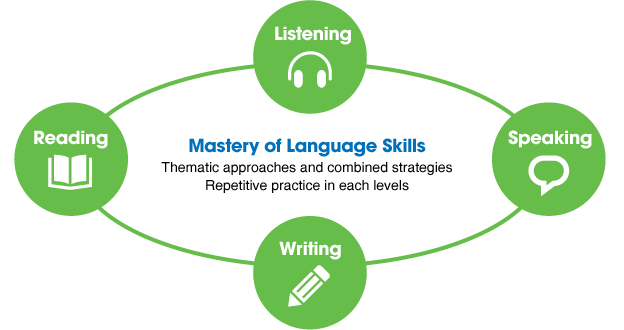Part 1: Improving Your Spoken English

1. Speak a little English every day.
The absolute best way to learn any new language is just to speak it. It doesn’t matter if you only know five English words or if you’re practically fluent — speaking English with another person is the fastest, most effective method of improving.
2. Work on your pronunciation.
Even if you have an acceptable grasp of the English language, with good grammar and an extensive vocabulary, native English speakers may find you very difficult to understand if you don’t work on your pronunciation.
3. Expand your vocabulary and use idiomatic phrases.
The wider your vocabulary and the more English phrases you learn, the easier speaking English will become.
4. Attend an English class or discussion group.
Another great way to incorporate some extra English conversation into your weekly routine is to sign up for a class of discussion group.
5. Carry a dictionary.
Carrying an English dictionary with you at all times (whether it’s an actual book or a phone app) can be very useful.
———————————————————
Part 2. Improving Your Writing, Reading and Listening Skills
1. Listen to English radio or podcasts.
One of the best ways to improve your English listening comprehension is to download English-language podcasts or radio apps on your phone or MP3 player.
2. Watch English movies and TV shows.
Another fun way to improve your listening comprehension is to watch English movies and TV shows.
- Step 1: Watch an English movie
- Step 2: Make an honest list of all the words that you thought were pronounced in a
different way. - Step 3: By the end of the movie, if your list is small, your pronunciation is not so bad.
However, if your list is long, you need to work on pronouncing those words. - Step 4: If you are not sure about the pronunciation, use the help of Internet tools or
download a dictionary app on your phone to help with correct yourself.
3. Read an English book, newspaper or magazine.
Reading is an essential part of learning a new language, so don’t forget to practice!
4. Keep a diary in English.
Aside from reading and listening comprehension, you should also spend some time working on your written English.
5 .Find an English-speaking pen-pal.
Once your written language skills have improved, you could consider getting an English speaking pen-pal!
———————————————————
Part 3: Committing to Your New Language
1. Stay motivated.
When learning any new language, it is important to stay motivated and never give up on your goal of fluency.
2. Practice every day.
If you want to gain fluency quickly, you need to commit to practicing every day.
3. Train yourself to think in English.
One way to make the transition from being very good at English to being fluent is to train your brain to actually think in the English language.
4. Make friends with English speakers.
One of the greatest tests of a person’s fluency in a second language is to put them in a room with a bunch of native speakers and see if they can follow and contribute to the conversation.
5. Don’t be afraid to make mistakes.
The biggest obstacle that stands in the way of learning a new language is the fear of making mistakes.
The world currently has 373 million native English speakers, while the other 1.08 billion are non-native English speakers. Learning English as your second language can be tricky, like any different language.
However, there are various reasons why studying foreign languages is more important than ever, like English. It can help you open up job opportunities, boost your brain health, gain self-confidence through improving communication, and develop a deeper understanding and appreciation for other cultures. Because of this, we listed below some tips and tricks for improving your English skills.
We also reached out Jeninder Kaur, who is a school teacher at Burwood academy and an Educational Author at Parental Daily in Sydney to know her opinion about how students can improve their English skills. She adds that “regular vocabulary exercises, reading newspaper, and consistent conversation both at school and with your friends are key methods to improve your language skills.” She also shares that learning phrases rather than single words can also immensely improve your english language skills.





